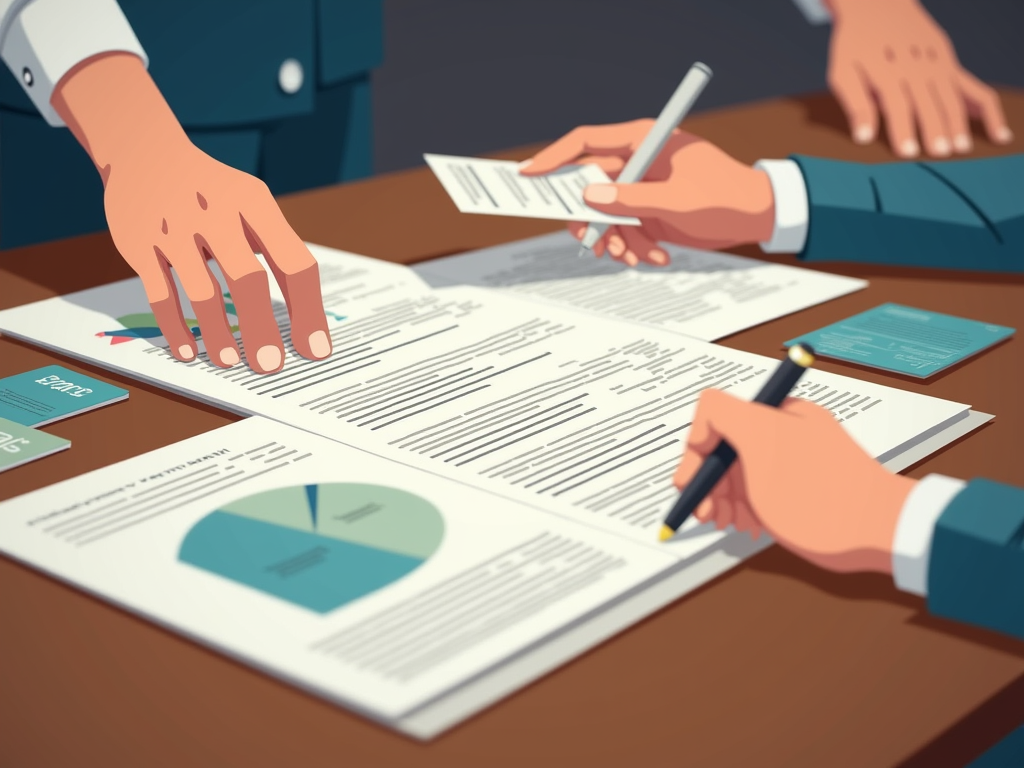Finding the right tradesperson can feel like navigating a maze. After many years in the building trade, I’ve seen countless homeowners make costly mistakes when hiring contractors. From expired credentials to missing insurance, these errors can turn your dream project into a nightmare. But here’s the good news – choosing the right tradesperson isn’t about luck. It’s about knowing exactly what to look for, what questions to ask, and most importantly, what red flags to watch out for. Let me share my proven methods for finding trusted professionals who’ll treat your home as if it were their own.
Highlights
- Find reliable tradespeople through builders’ merchants, trade associations, and verified recommendations
- Always verify qualifications and check current insurance documentation
- Request and compare detailed written quotes
- Never pay the full amount upfront – use a staged payment schedule
- Keep thorough documentation including contracts, certificates, and progress photos
- Maintain clear communication and set expectations from the start
- Document all work progress and changes in a site diary
- Ensure proper handover including all necessary certificates and warranties
Before You Start

After many years in the building trade, I’ve learned that proper preparation prevents most problems. Let me walk you through what you need to consider before you even start looking for a tradesperson.
Project Planning
Start by creating a clear project vision. Don’t just think about it – write down exactly what you want to achieve. I’ve seen too many projects go wrong because of vague requirements. Take detailed photographs of the area to be worked on, including any problem spots or special features. These visual records are invaluable when discussing your project with potential tradespeople.
Your project documentation should capture everything from your ideal start date to your preferred materials. Think about practical matters too – will you need to move furniture? Are there access restrictions to consider? What about parking for deliveries and workers? These details matter more than you might think.
Understanding Costs
Let’s talk about realistic budgeting. Here’s something I tell all my clients: take your initial budget estimate and add 20% for contingencies. You’d be surprised how often that extra cushion saves the day.
Your budget needs to cover more than just materials and labour. Consider these often-forgotten costs:
- Skip hire and waste removal
- Building control fees
- Temporary accommodation if needed
- Storage costs for furniture
- Professional cleaning afterwards
Legal Requirements
Before any work begins, check if you need:
- Planning permission from your local authority
- Building regulations approval
- Party wall agreements with neighbours
- Listed building consent if applicable
Don’t skip this step – I’ve seen projects halted halfway through because someone forgot to check the legal requirements. Contact your local authority’s building control department early in the planning stage.
Property Preparation
Proper preparation of your property is crucial. You’ll need to:
- Create clear access routes through your property
- Arrange secure storage for materials
- Protect valuable items or remove them
- Consider security measures during the work
- Inform your home insurance provider about the planned work
Documentation Management
Create a project folder – either digital or physical – containing:
- Your detailed project brief
- Current photographs
- Inspiration images
- Budget spreadsheet
- Timeline requirements
I always tell my clients to keep both digital copies and a physical folder. You’d be surprised how often you need to refer back to these details during the project.
Remember my golden rule: “Time spent in preparation saves time in execution.” Taking these steps now will help you find the right tradesperson and ensure your project runs smoothly from start to finish.
Need help understanding building regulations? Check the Planning Portal for official guidance, or contact your local authority’s building control department.
For additional guidance on property preparations, consult the Federation of Master Builders or TrustMark websites.
Finding Potential Tradespeople

Finding the right tradesperson isn’t just about picking the first name you find online. After years in the trade, I’ve learned that using multiple sources gives you the best chance of finding a reliable professional.
Personal Recommendations
Start with your local network. Ask friends, family, and neighbours about their experiences. But here’s a crucial tip – don’t just take their word that someone was “good.” Ask specific questions about:
- How the tradesperson handled unexpected problems
- Whether the final price matched the quote
- If they completed the work on time
- Their communication throughout the project
Trade Associations
Always check if your tradesperson is registered with relevant trade bodies. The most reputable ones include:
- Federation of Master Builders (FMB) for general building work
- Gas Safe Register for gas work
- NICEIC for electrical work
- TrustMark for government-endorsed standards
Online Platforms
While online platforms can be useful, use them wisely. The main ones to consider are:
- Checkatrade – known for thorough vetting processes
- MyBuilder – allows you to post specific job requirements
- Rated People – offers customer reviews and ratings
- TrustATrader – focuses on local tradespeople
Verification Process
Don’t just rely on one source. Create a shortlist of potential candidates and:
- Check their online reviews across multiple platforms
- Verify their trade association memberships
- Look at their company history
- Review their portfolio of similar work
- Request to visit current or recent projects
Remember, a good tradesperson will welcome these checks. As I always say, “If they’re reluctant to provide information, they’re probably hiding something.”
Need help verifying credentials? Contact the relevant trade association directly through their official websites.
Checking Credentials

After creating your shortlist of potential tradespeople, it’s time for the crucial step of verifying their qualifications. This isn’t just paperwork – it’s about ensuring your safety and getting quality workmanship.
Essential Qualifications
Different trades require specific qualifications. Here’s what to look for:
For gas work, verify:
- Current Gas Safe registration
- Specific types of gas work they’re qualified to do
- Valid ID card with photo and expiry date
For electrical work, check:
For plumbing, ensure they have:
- NVQ Level 2 qualification
- City & Guilds certification (for experienced plumbers)
- Registration with the Chartered Institute of Plumbing and Heating Engineering
Insurance Verification
Every tradesperson should have:
- Public liability insurance (minimum £1 million cover)
- Professional indemnity insurance
- Personal accident cover
- Employers’ liability insurance if they have workers
Professional Memberships
Look for membership in relevant trade bodies:
- Federation of Master Builders for general building work
- Construction Skills Certification Scheme (CSCS) card
- Trade-specific associations
Verification Process
Don’t just take their word for it. Here’s how to verify credentials:
- Ask to see original certificates and cards
- Check registration numbers on official websites
- Contact trade bodies directly
- Verify insurance certificates with providers
- Request recent client references
Remember, legitimate professionals will welcome these checks. If someone gets defensive or makes excuses, consider it a red flag. As I always say, “A qualified tradesperson is a proud tradesperson.”
Need to verify specific credentials? Visit the Gas Safe Register or NICEIC websites directly.
Getting and Comparing Quotes

After checking credentials, it’s time to get detailed quotes. Let me share what I’ve learned about getting quotes that actually tell you what you need to know.
Quote Preparation
Before you contact anyone, prepare a detailed project specification. Include:
- Exact scope of work required
- Your preferred materials and finishes
- Timeline expectations
- Any specific requirements or constraints
- Access and parking arrangements
Getting Multiple Quotes
Always get at least three quotes for any significant work. This gives you a realistic picture of costs and approaches. When meeting traders:
- Schedule face-to-face meetings
- Show them exactly the same specification
- Ask about their approach to the work
- Discuss potential challenges
- Take notes about their suggestions
Understanding Quote Details
A proper quote should include:
- Detailed breakdown of labour costs
- Material specifications and costs
- Timeline for completion
- Payment schedule
- Waste removal arrangements
- Any excluded items
Comparing Quotes
Don’t just look at the bottom line. Consider:
- Level of detail provided
- Quality of materials specified
- Proposed timeline
- Payment terms
- Warranties offered
- Communication style
Here’s something many homeowners miss – the cheapest quote isn’t always the best value. I’ve seen too many “bargain” quotes turn into expensive nightmares because of hidden costs or cut corners.
Red Flags in Quotes
Watch out for:
- Vague descriptions of work
- Missing details about materials
- Unusually low prices
- No breakdown of costs
- Pressure to decide quickly
- Large upfront deposits
Remember, a professional tradesperson will provide a detailed written quote, not a price scribbled on the back of an envelope. If they won’t put it in writing, walk away.
Need help understanding building quotes? The Federation of Master Builders provides excellent guidance on what should be included.
Making It Official

After selecting your tradesperson, it’s time to get everything in writing. Let me share what a proper agreement should look like, based on years of experience in the trade.
Written Contract
A verbal agreement isn’t enough protection for either party. Your contract should clearly outline:
- Detailed scope of work
- Timeline with start and completion dates
- Payment schedule and terms
- Material specifications
- Warranties and guarantees
- Dispute resolution process
Essential Contract Components
Your written agreement should specify:
- Contact details for both parties
- Working hours and site access arrangements
- Waste removal responsibilities
- Insurance details and certificates
- Building regulation compliance
- Subcontractor information if relevant
Payment Terms
Be crystal clear about money matters:
- Initial deposit (typically 20-30%)
- Stage payments linked to completion milestones
- Final payment conditions
- Retention amount (usually 5%)
- Payment methods accepted
Cooling-Off Period
Remember, you have a 14-day cooling-off period after signing. However, if you’ve asked for work to start within this time, you may still need to pay for completed work.
Documentation
Keep copies of:
- Written contract
- Insurance certificates
- Material specifications
- Building permits
- Safety certificates
Remember, a professional tradesperson will welcome a proper contract. As I always say, “If they won’t put it in writing, they won’t stand behind their work.”
Need help with contracts? The Federation of Master Builders provides excellent contract templates, or consult Citizens Advice for guidance.
Working Together

After signing the contract, maintaining a good working relationship with your tradesperson is crucial. Let me share what I’ve learned about making the project run smoothly.
Communication Protocol
Establish a clear communication system from day one. This means:
- Regular progress updates
- Designated contact person
- Preferred communication method
- Response time expectations
- Emergency contact details
Project Management
Keep track of progress with:
- Daily site diary entries
- Progress photographs
- Material delivery records
- Decision logs
- Change order documentation
Quality Control
Regular inspections are essential. Set up:
- Weekly progress meetings
- Quality checkpoints at key stages
- Building control inspections when required
- Material quality checks
- Workmanship standards reviews
Problem Resolution
If issues arise, follow these steps:
- Address concerns immediately
- Document everything in writing
- Reference the contract terms
- Keep communication professional
- Follow agreed dispute procedures
Site Management
Establish clear guidelines for:
- Working hours
- Site access arrangements
- Storage areas
- Waste management
- Security measures
- Neighbour considerations
Remember, a successful project relies on mutual respect and clear communication. As I always tell my clients, “Good relationships build better projects.”
Need guidance on managing building projects? The Federation of Master Builders offers excellent resources for homeowners working with tradespeople.
FAQs
How many quotes should I get before choosing a tradesperson?
Always obtain at least three quotes for any significant work. This helps you understand average costs and gives you opportunities to compare different approaches, expertise levels, and material options. Make sure each quote is detailed and in writing, not just a verbal estimate.
What essential insurance should a tradesperson have?
A tradesperson must have:
- Public liability insurance (minimum £1 million cover)
- Professional indemnity insurance
- Personal accident cover
- Employers’ liability insurance (if they have workers)
- Tools and equipment insurance
- Business van insurance
Should I pay a deposit upfront, and if so, how much?
A reputable tradesperson may ask for a deposit of 20-30% to cover materials. Never pay the full amount upfront. Payment should be linked to completion milestones, with final payment only after satisfactory completion.
How can I verify trade qualifications and memberships?
Contact relevant regulatory bodies directly to verify:
- Professional memberships
- Trade-specific qualifications
- Insurance certificates
- Registration numbers
Always check expiry dates and verify documentation with issuing authorities.
What should be included in a written contract?
A proper contract should include:
- Full contact details for both parties
- Detailed scope of work
- Start and completion dates
- Payment schedule
- Material specifications
- Warranty information
- Dispute resolution process
How do I check references effectively?
Ask for at least three recent references and:
- Speak to previous customers directly
- View completed projects where possible
- Check online reviews across multiple platforms
- Request examples of similar work
- Visit ongoing projects if possible
What are the red flags to watch out for when hiring?
Watch for:
- Reluctance to provide credentials
- Pressure to decide quickly
- Unusually low quotes
- Large upfront payment demands
- Vague or verbal-only quotes
- No physical business address
How do I handle disputes with a tradesperson?
- Maintain clear communication
- Document all issues in writing
- Reference the contract terms
- Suggest reasonable solutions
- Keep emotions out of discussions
- Set realistic timeframes for resolution
What payment terms are standard in the industry?
Standard terms typically include:
- Initial deposit (20-30%) for materials
- Stage payments linked to completion milestones
- Retention fee (usually 5%)
- Final payment upon satisfactory completion
- No cash payments – use traceable methods
When should I contact Trading Standards?
Contact Trading Standards if:
- Work is substandard or unsafe
- The tradesperson breaches contract terms
- They refuse to address legitimate complaints
- You suspect fraudulent behaviour
Always contact Citizens Advice first, who will refer serious cases to Trading Standards

